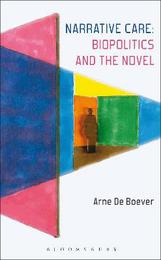
|
Narrative Care: Biopolitics and the Novel
Paperback / softback
Main Details
Description
If the September 11 terror attacks opened up an era of crises and exceptions of which we are yet to see the end, it is perhaps not surprising that care has emerged in the early twenty-first century as a key political issue. This book approaches contemporary narratives of care through the lens of a growing body of theoretical writings on biopolitics. Through close-readings of J.M. Coetzee's Slow Man, Kazuo Ishiguro's Never Let Me Go, Paul Auster's The Book of Illusions, and Tom McCarthy's Remainder, it seeks to reframe debates about realism in the novel ranging from Ian Watt to Zadie Smith as engagements with the novel's biopolitical origins: its relation to pastoral care, the camps, and the welfare state. Within such an understanding of the novel, what possibilities for a critical aesthetics of existence does the contemporary novel include?
Author Biography
Arne De Boever is Assistant Professor of American Studies and Director of the MA Program in Aesthetics and Politics in the School of Critical Studies, California Institute of the Arts, USA.
ReviewsDe Boever presents a provocative hypothesis about fictional narrative's connection to biopolitics and biopower. The representative contemporary American texts are well-chosen, and his close readings of them forcefully and effectively support his claim that contemporary metafictional narratives, while sometimes complicit with biopower, attempt through various means to resist the biopolitical system. -- Michelle R. Martin, Temple University * Journal of Modern Literature, Vol. 38.1 * 'It is clear that we cannot go on as before' (142), Arne De Boever states in his paradigm-shifting volume, Narrative Care: Biopolitics and the Novel. De Boever's study carries on a tradition of Foucauldian literary criticism earlier exemplified by D.A. Miller's The Novel and the Police, but it achieves a significant shift in analytical focus: from surveillance to biopolitical control, from the individual body to the body politic, and from narrative discipline to narrative care. -- Stephanie Hsu, Pace University * Studies in the Novel, Vol. 46, No. 3, 2014 * Timely and insightful ... Narrative Care is a uniquely revealing book for anyone engaged in body, gender, ethical, or health studies and naturally also for researchers of the discussed authors. * Hungarian Journal of English and American Studies * ...[De Boever's] argument on the politics and ethics of narrative is bold, imaginative, and accessible to readers unfamiliar with philosophy and theory on biopolitics. -- Nicolette Bragg * College Literature * Novels govern our lives: Narrative Care allows us to understand this statement literally. Should we try to escape the biopolitical scene of literature? Would that cure our political wounds? Arne De Boever offers an alternative solution: to subtract the emancipatory practice of care from its biopolitical appropriation. This solution implies that we think the relations between the novel, aesthetics, and politics anew. It's rare to see a literary critic take such good care of philosophy. -- Frederic Neyrat, Philosopher and Visiting Scholar in the Department of Comparative Literature, University of Wisconsin, Madison, USA With his signature mode of meticulous reading and bold speculative thinking, Arne De Boever extends the argument from his States of Exception in the Contemporary Novel to advocate further the unique capacity of literature to think through the quandary of contemporary political problems. Narrative Care disrupts the codified narrative of biopolitics by invoking (always in the form of asking questions) literature's way of deciding what might be depicted-written--as life. De Boever's biopolitical history of the novel thus spearheads one of the key epistemological inquiries of our time: how are we to determine (and act upon) the political significance of modernity's logic of the living? -- Stathis Gourgouris, Professor of Classics, English, and Comparative Literature and Society and Director of the Institute of Comparative Literature and Society, Columbia University, USA Productively exploiting the tensions between Giorgio Agamben and Michel Foucault, bare life and biopolitics, Arne De Boever leads us into a fascinating critical examination of care and caring for others. Most important, he makes a compelling case that the contemporary novelistic texts he treats use character and characterization, reading and narration, to draw us into a correlative experience of ethical reasoning and world-making. -- David Palumbo-Liu, Professor of Comparative Literature and English Stanford University, USA
|